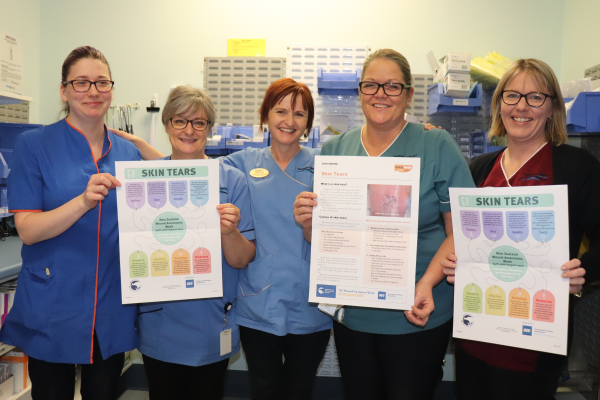Love your skin – it’s Wound Awareness Week
Southern DHB’s Wound Care Specialists are reminding people of all ages about the importance of looking after their skin, during Wound Awareness Week 24-30 August 2020.
The theme for this year’s Wound Awareness week is Skin Tears, which is an injury that causes the skin to peel back or can result in total skin loss. Older people and new born babies are at the highest risk of this type of injury. Skin tears are the most common skin injury occurring in aged care facilities, with the majority being preventable.
In most people they cause minor wounds and often bruising, however they can cause more serious wounds if your skin is fragile, you have other health issues such as diabetes, or if the injury is on your leg and you have blood flow concerns. They are mostly caused from falls, knocks or bumps or the removal of plasters, mostly on the legs, arms and back of hands.
Southern DHB is well represented among national leaders in wound care, with Southland Clinical Nurse Specialist Wound, Mandy Pagan also President of the New Zealand Wound Care Society, Dunedin’s Nursing Practitioner Vascular, Rebecca Aburn is the Vice-President and Clinical Nurse Specialist Wound, Emil Schmidt is the Treasurer.
Skin tears can lead to complications such as ongoing pain, infection and delayed healing – Mandy and her colleagues deal with serious wounds on a daily basis at hospitals, aged care facilities and in the community at patient’s homes throughout Southern.
“The great news is that there are simple, inexpensive precautions people can take to prevent and treat skin tears. These include: making your home as safe as possible to avoid falls and knocks to the skin; a healthy diet; staying hydrated; keeping active; moisturising your skin and avoid using plasters on fragile skin.
“For example, using moisturiser on your arms and legs once or twice a day can reduce the risk of a skin tear by up to 50%. This simple daily regime will improve your skin health and make your skin more resistant to injury.”
To help members of the public understand the prevention and treatment of these common injuries, the New Zealand Wound Care Society has this year partnered with the Accident Compensation Corporation (ACC) for the first time in New Zealand, and the New Zealand Doctor publication, to produce a special patient information sheet on Skin Tears that is free to the public.
Members of the public can go to the New Zealand Doctor website nzdoctor.nz and register for up to 21 patient information sheets FREE of charge. When you register for the patient information sheets on the website, the payment option is bypassed.
As well as Skin Tears, the site has patient information sheets available topics including:
|
|
|
We encourage people to sign up for the patient information sheets because the more information people have, the more they are able to make informed health care decisions.
“We want people in our Southern communities to know about the importance of protecting their skin and to prevent non-healing wounds, both for themselves and for their loved ones. It is important that skin tears are treated immediately and properly. If people are in any doubt, they should call their GP straight away or visit their pharmacist for advice – don’t leave it,” she says.
PHOTO CAPTION: Some team members from the Southern DHB’s Wound Care Service supporting Wound Awareness Week: (left to right) student nurse Gemma Buzzard, Jo Hunter, Mandy Pagan, Rebecca Aburn, and Rachel Taylor.

